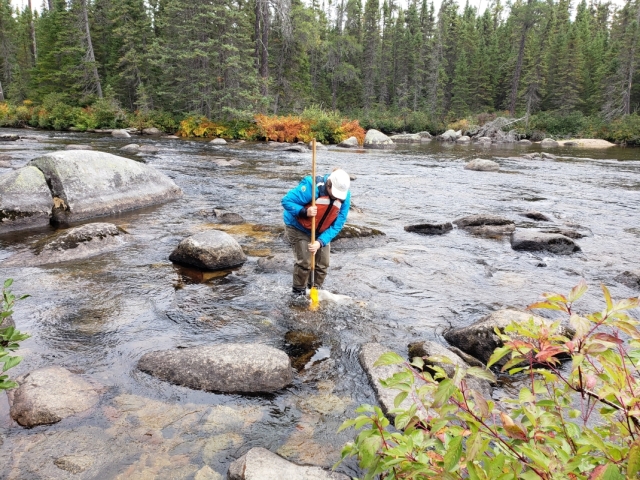About the Canadian Aquatic Biomonitoring Network
Here is an overview of the Canadian Aquatic Biomonitoring Network (CABIN) led by Environment and Climate Change Canada (ECCC). Find out about its history, how it is run and who its participants are.
What is CABIN?

The Canadian Aquatic Biomonitoring Network (CABIN) is a collaborative network led and maintained by Environment and Climate Change Canada (ECCC). CABIN provides nationally standardized protocols to monitor the health of aquatic ecosystems by sampling the organisms that live there. CABIN promotes data sharing among network participants through the web-accessible CABIN database. Network participants can share biomonitoring data and perform comparable assessments of aquatic ecosystem health across Canada. These tools reduce the resources required by a single group to assess aquatic ecosystem health.
CABIN can be used by anyone interested in collecting, managing, assessing, and sharing information on aquatic ecosystem health in Canada. Many organizations use CABIN, including government, Indigenous groups, community-based monitoring groups, industry, and academia.
To join CABIN there is a training and certification program. This ensures a consistent, and scientifically rigorous approach to aquatic biomonitoring using benthic macroinvertebrates.
Learn more about the benefits of CABIN and join the network!
History of CABIN
Understanding the state of aquatic ecosystem health at a national level is challenging given the size of Canada and the diversity of its aquatic ecosystems. Prior to CABIN, there was not a national standardized approach available, resulting in a patchwork of freshwater biomonitoring efforts across the country. Environment and Climate Change Canada launched CABIN nationally in 2006 to provide consistent biomonitoring methods and a shared database for benthic macroinvertebrates from freshwater ecosystems across Canada.
CABIN evolved from 1990s federal research programs, which were influenced by existing national biomonitoring programs in places such as Australia and the United Kingdom.
See “Other Relevant Resources” for research papers related to the development of CABIN.
ECCC vision and mission for CABIN
ECCC vision
To promote and expand collaborative biomonitoring and assessment approaches in freshwater ecosystems in Canada through ECCC scientific leadership.
ECCC mission
Through the Canadian Aquatic Biomonitoring Network, ECCC enables Canadians with an interest in environmental management to collect, manage, assess and share information on aquatic ecosystem health and biodiversity.
To achieve this mission, ECCC:
- Provides open access to nationally consistent and scientifically sound biomonitoring protocols.
- Provides a training and certification program.
- Maintains an informative website, a web-accessible database, and online analytical and reporting tools.
- Facilitates knowledge sharing, especially in remote areas, through network engagement.
- Provides a collaborative forum for continuous advancement of biomonitoring approaches.
- Provides guidance on taxonomic standardization to ensure data comparability.
- Provides guidance on quality assurance and quality control standards.
CABIN leadership and ECCC regional contacts
ECCC National CABIN Team
Environment and Climate Change Canada scientists from across the country participate on the National CABIN Team. They work towards achieving ECCC’s Mission for CABIN and ensure scientific leadership in aquatic biomonitoring.
ECCC CABIN Regional Contacts are members of the National CABIN Team. They can provide information about regional CABIN activities, training, potential network collaboration opportunities and technical support for CABIN studies.
ECCC Regional Contacts for CABIN in each of the provinces of Canada are:
- British Colombia and Yukon Territory: Melissa Gledhill
- Alberta, Saskatchewan and Manitoba: Emily McIvor
- Northwest Territories and Nunavut: Stephanie Strachan
- Ontario: Tim Pascoe
- Quebec: Édith Lacroix
- Nova Scotia, New Brunswick, Prince Edward Island and, Newfoundland and Labrador: Liang Zhu
For general inquiries about CABIN, please reach out to us.
CABIN Science Team
External expert biomonitoring scientists and Environment and Climate Change Canada scientists make up the CABIN Science Team. The CABIN Science Team provides science advice to the ECCC National CABIN Team on national implementation of current biomonitoring research, ensuring that methods are scientifically defensible and nationally consistent.
Who participates in CABIN?
CABIN is a collaborative network-of-networks comprised of Indigenous Groups and Governments, non-government and community-based organizations, as well as all levels of government and academia.
Distribution of CABIN participants as of 2022

Long description
Activities of network participants may include:
- Monitoring, assessing and reporting on ecosystem health, using the CABIN tools.
- Contributing data to the CABIN database to enhance biodiversity knowledge across Canada.
- Collaborating on biomonitoring projects with other network participants in areas of joint interest.
- Developing and testing new protocols or tools in collaboration with ECCC.
Visit the CABIN Activities Map to see where CABIN sampling has taken place across the country.